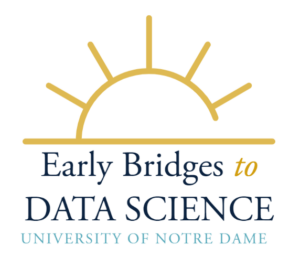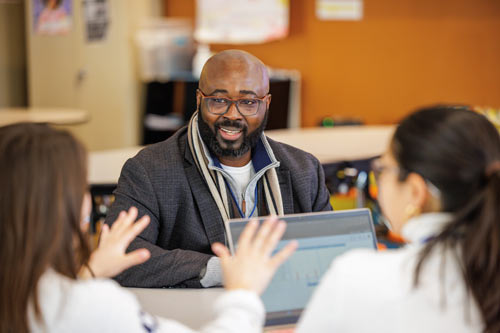
Purpose
The Early Bridges to Data Science (EBDS) program aims to bridge the gap between traditional classroom education and the evolving needs of the data science workforce. This initiative is a collaboration between Notre Dame faculty and local middle school teachers, with a focus on fostering communities of interest and creating classroom content that equips students to succeed in a data-driven economy. Recognizing the underrepresentation of students from underserved communities in STEM fields, the program is committed to delivering culturally relevant and engaging data science content to these students, particularly in rural and urban areas. The content is designed for flexible delivery, either during regular classroom instruction or through before- and after-school programs.
Middle school is a key focus for the EBDS program, as students at this stage typically develop foundational skills in numeracy, arithmetic, probability, and basic data visualization, making it an ideal time to introduce data science concepts.
Description
The EBDS program is built around three core objectives:
- Providing Standards-aligned Data Science Curricula: To expand access to data science curricula that align with educational standards, the program partners undergraduate business analytics students at the University of Notre Dame with local middle school teachers. Through a semester-long apprenticeship in the Early Bridges to Data Science course, each undergraduate works with a middle school science or math teacher to develop and teach data science lessons. This not only strengthens the undergraduates’ teaching and curriculum development skills but also enriches their understanding of data science education.
- Enhancing Teacher Proficiency in Data Science: A key component of the program is a 3-day summer training seminar for middle school math and science teachers, led by a mix of Notre Dame faculty and industry experts. The seminar introduces teachers to the core principles of data science and equips them with the tools, resources, and knowledge necessary to effectively integrate relevant data science content into their classrooms.
- Providing Ongoing Curriculum Coaching Support: To ensure the successful integration of data science education, the EBDS program offers continued curriculum coaching support to participating teachers. After the summer seminar, each teacher is paired with a curriculum coach who offers mentorship and practical guidance throughout the academic year. These coaches, often experienced educators from previous EBDS cohorts, play a critical role in supporting teachers as they implement data science lessons in their classrooms.
In the News

Building Virtual Bridges: Fred Nwanganga’s class has Mendoza students teaching data science to local middle schoolers. >>Read more
The Solution to Better Living in the Digital World: According to Nwanganga, “We’re not doing a whole lot in middle school and high school to prepare students to become informed consumers of data”. >>Read more
By focusing on these three areas, the EBDS program seeks to empower teachers and students, fostering a generation better prepared for the data-driven challenges of the future.
Program Details
Program Benefits
Application Criteria
Questions
For questions or more information about the Early Bridges to Data Science program, please contact the program coordinators at earlybridges@nd.edu or Dr. Frederick Nwanganga.